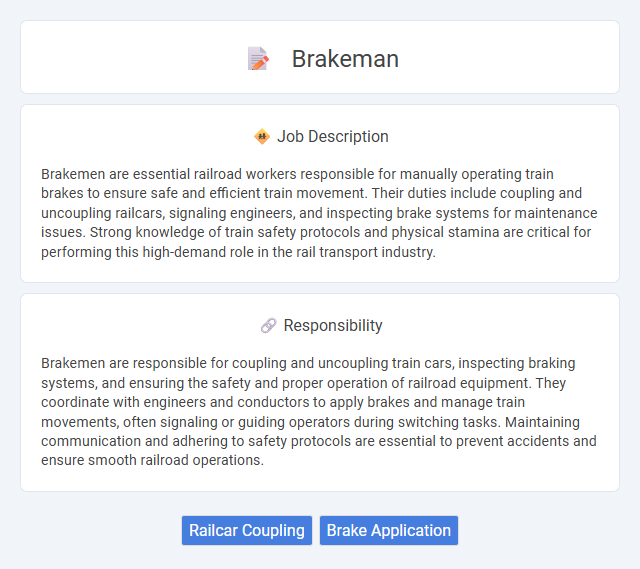
Brakemen are essential railroad workers responsible for manually operating train brakes to ensure safe and efficient train movement. Their duties include coupling and uncoupling railcars, signaling engineers, and inspecting brake systems for maintenance issues. Strong knowledge of train safety protocols and physical stamina are critical for performing this high-demand role in the rail transport industry.
Individuals with strong observational skills and the ability to remain vigilant for extended periods are more likely to be suitable for a brakeman job. Candidates who can handle physically demanding tasks and respond quickly to changing conditions might have a higher probability of success in this role. Those prone to fatigue or difficulty maintaining focus may find the job challenging and less appropriate for their skill set.
Qualification
Brakeman positions require strong knowledge of railroad operations, safety protocols, and mechanical skills to inspect and maintain freight cars. Candidates typically need a high school diploma or equivalent, with additional training in transportation safety and certifications such as a conductor or brakeman license being highly advantageous. Physical fitness and the ability to work in challenging outdoor environments are essential qualifications for job performance and safety compliance.
Responsibility
Brakemen are responsible for coupling and uncoupling train cars, inspecting braking systems, and ensuring the safety and proper operation of railroad equipment. They coordinate with engineers and conductors to apply brakes and manage train movements, often signaling or guiding operators during switching tasks. Maintaining communication and adhering to safety protocols are essential to prevent accidents and ensure smooth railroad operations.
Benefit
Working as a brakeman likely offers significant benefits including steady employment in the rail industry and opportunities for skill development in train operations and safety protocols. The role may provide a stable income along with potential access to health benefits and retirement plans commonly associated with transportation jobs. Furthermore, brakemen probably experience a sense of job security due to ongoing demand for railroad workers in freight and passenger services.
Challenge
A Brakeman's job likely involves handling challenging physical tasks that require strength and stamina. Navigating heavy equipment and ensuring train safety could present consistent risks demanding vigilance and quick decision-making. Adapting to unpredictable weather and tight schedules may further amplify the job's complexity and stress levels.
Career Advancement
Brakemen play a crucial role in railroad operations by ensuring the safe coupling and uncoupling of train cars, which provides a strong foundation for career progression within the railroad industry. Gaining experience as a brakeman can lead to advanced positions such as conductor or locomotive engineer, offering increased responsibility and higher earning potential. Continuous training and a thorough understanding of safety regulations significantly enhance opportunities for career advancement and specialization in the field.
Key Terms
Railcar Coupling
Brakemen specializing in railcar coupling ensure the safe and efficient connection and disconnection of railcars, maintaining proper alignment and secure coupling mechanisms to prevent accidents. Their expertise includes inspecting couplers, air hoses, and slack adjusters while coordinating with conductors and engineers to facilitate smooth train assembly and movement. Proficiency in signaling and compliance with safety regulations is critical for minimizing derailments and ensuring operational efficiency in rail yard environments.
Brake Application
Brake application in a brakeman's job involves the precise control and timing of railroad car brakes to ensure safe train handling and stopping distances. Effective brake application requires knowledge of air brake systems, coordination with the engineer, and quick response to changing track conditions. Proper execution minimizes derailment risks and enhances overall train safety during operations.
 kuljobs.com
kuljobs.com